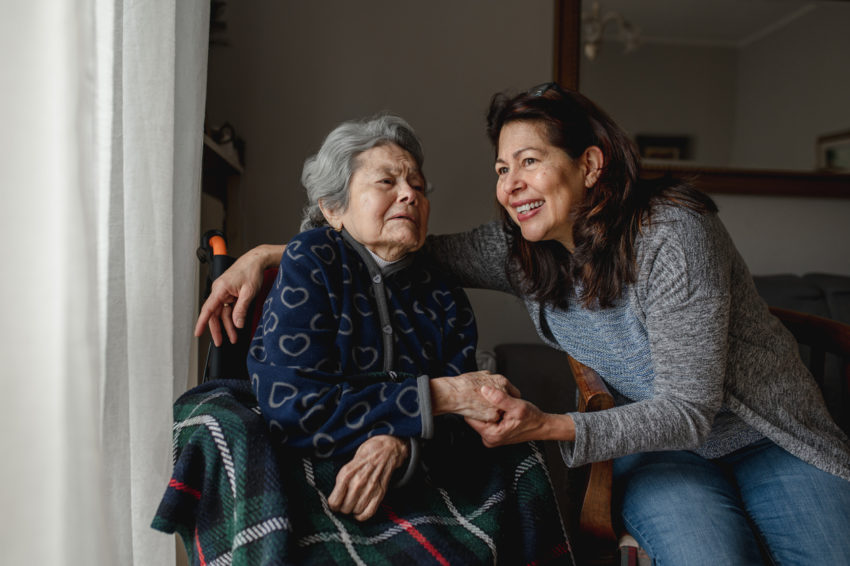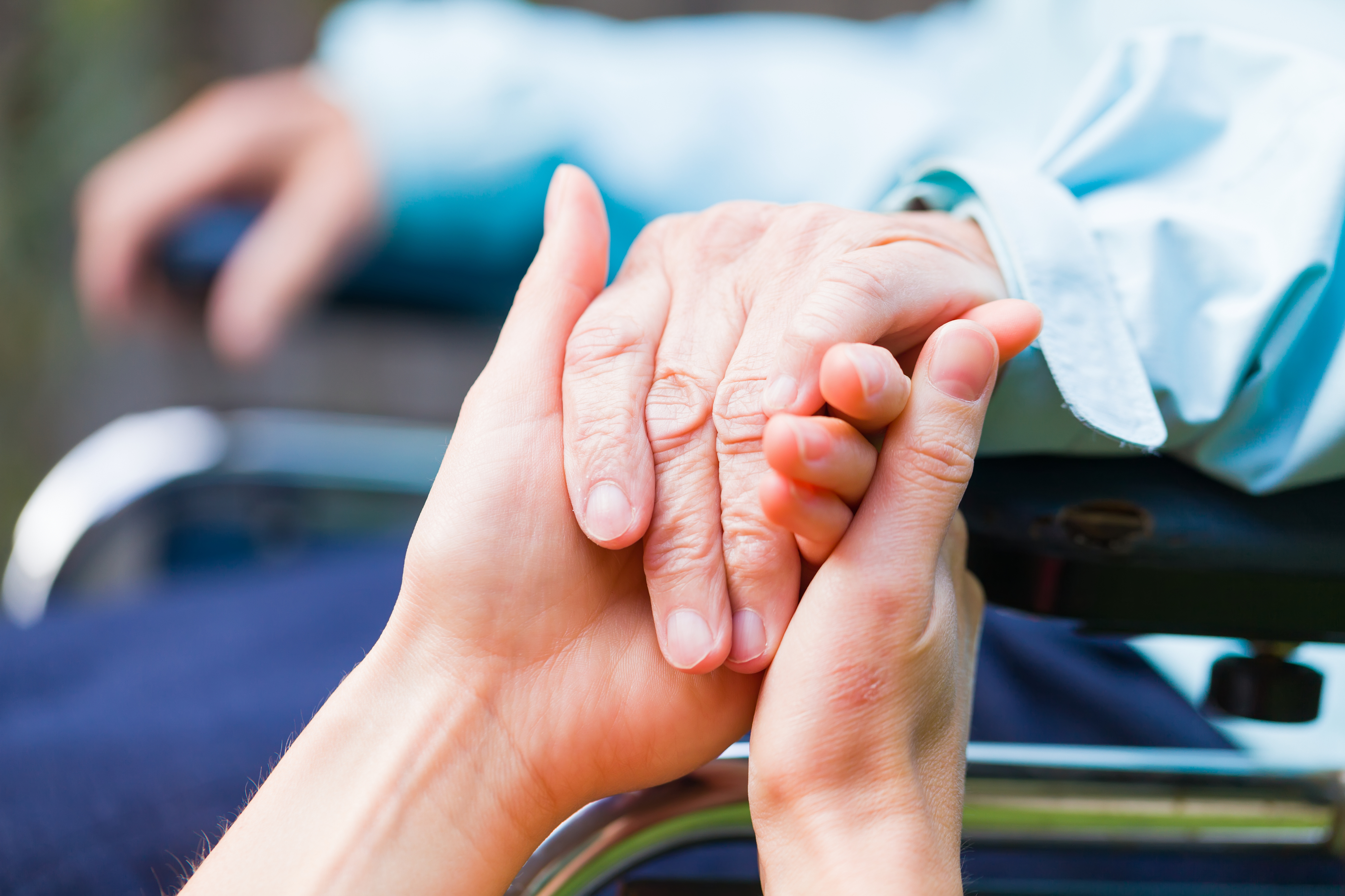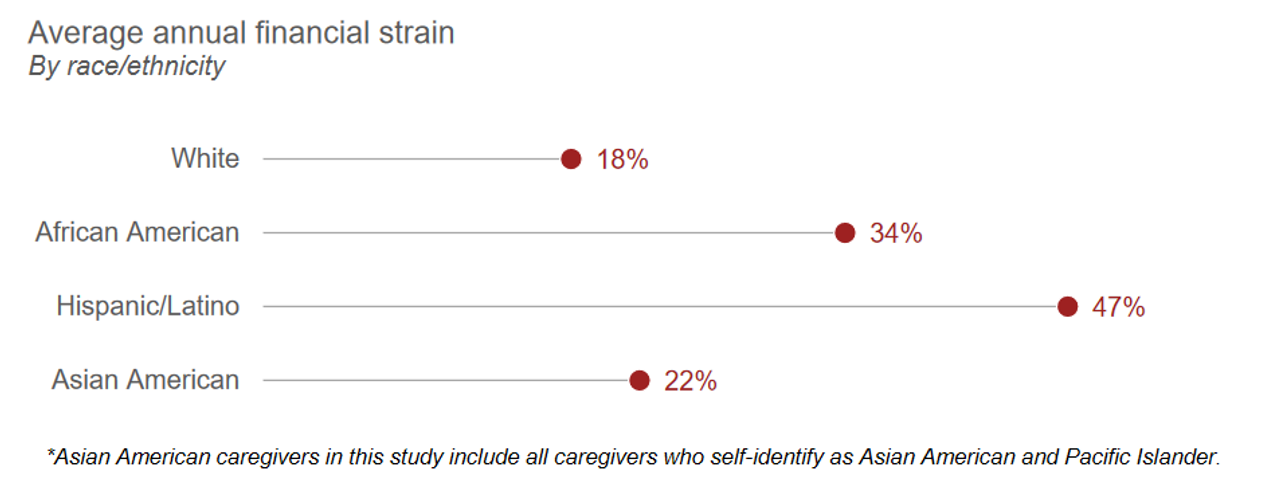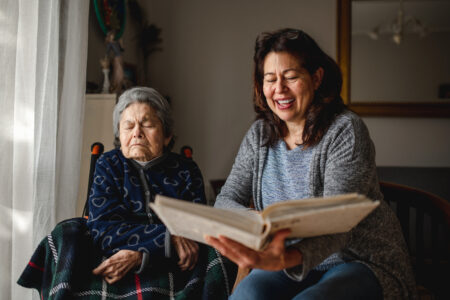
Share On Social!
Latinos spend $7,167 a year caring for aging loved ones, says an AARP survey.
While this is actually less than what Whites caregivers spend out of pocket a year ($7,300), the financial strain is greater because it represents almost half the income of Latino caregivers, according to the report.
Currently, over 48 million Americans provide unpaid care to an adult family member or friend who has a physical health condition or a mental health issue like Alzheimer’s and dementia. Most caregivers say they use their own money to look after their loved ones, like rent or mortgage payments, home modifications like wheelchair ramps, and medical costs.
“About half of caregivers say they have experienced financial setbacks. This may mean they have had to curtail their spending, dip into personal savings, or cut back on retirement contributions. The recent COVID-19 pandemic magnified sacrifices for caregivers, with 42% of respondents spending more time and money on caregiving,” according to AARP’s survey.
Let’s look more closely at the new survey, and what it means for Latinos.
What Does the Survey Say about Latino Caregivers?
In Latino culture, family is the center of life. As Latino parents age, children are often expected to become their caregivers.
1 in every 3 U.S. Latino households has at least one family caregiver. These Latino caregivers juggle jobs or leave the workforce to care for aging family members.
The new AARP survey shows just how economically stressful caregiving can be.
- Latino caregivers experience higher financial strain than White, Asian American, and African American caregivers.
- Latino and Asian American female caregivers experience much higher financial strain than their male counterparts.
- In the category of the most “highly financially–strained” caregivers (those earning less than $35,000 a year), 41% of Black and 59% of Latino caregivers were caring for someone who needed assistance with at least one activity of daily living.
In general, caregivers get little to no support.
This contributes to health issues. Many studies show that Latina caregivers of family members with Alzheimer’s deal with high levels of stress, anxiety, and depression symptoms.
“One of the main challenges among Hispanic caregivers is finding a balance between the needs of their loved one and the caregiver’s financial situation,” according to the National Hispanic Council on Aging (NHCOA). “On average, the Hispanic caregiver household income is $38,600, well below the national median ($54,700).”
Over half of all caregivers have diagnoses of depression, anxiety disorders, or substance abuse, said Dr. Deborah Little of McGovern Medical School at The University of Texas Health Science Center at Houston.
“These unpaid, informal and generous caregivers need support,” Little said via a news release. “When they do not get sufficient support, not only does their health decline but so does their ability to provide high-quality support for their loved one.”
What Do Advocates Say Should Be Done to Help Latinos Caregivers?
The study highlights the need for effective public policy to provide financial support for families, AARP says.
“The Credit for Caring Act was introduced in the Senate with bipartisan support, and would offer a non-refundable tax credit up to $5,000 for individual caregivers who earn between $7,500 and $75,000 per year,” according to KERA News.
Neighborhood cohesion also helps. According to one study, Latino caregivers who report high levels of neighborhood cohesion have fewer depressive symptoms than those caregivers living in less cohesive neighborhoods.
Asking for help early and often can also save Latina caregivers stress, time, and even money.
 In addition, NHCOA had these suggestions for getting improving life for Latino caregivers:
In addition, NHCOA had these suggestions for getting improving life for Latino caregivers:
- Strengthen financial programs for caregivers and families, especially for diverse communities.
- Educate Latino families about caregiving as a profession, and services available in English and Spanish.
- Develop information that addresses the specific needs of diverse caregivers and making it available through culturally and linguistically competent channels.
- Develop a systemic approach to addressing the particular needs of Latino caregivers.
- Make systemic changes to build communities’ capacity to support family caregivers.
- Create a caregiving hub to provide information and resources for Latinos.
- Create a 24/7 toll free line in English and Spanish to respond to family caregivers questions and concerns.
- Develop programs to break the stigma among the community and advocate for the allocation of resources to increase education and information among Hispanics about programs available for caregivers.
“National and local organizations play a decisive role in the process of disseminating information and creating awareness about the need for more data, resources and services available for Hispanic family caregivers,” according to NHCOA.
How You Can Help Latino Caregivers
If you’re a caregiver, join a clinical trial. Help your family member join one, too!
Clinical trials can help researchers create effective treatments, or better understand illnesses. For Alzheimer’s, researchers learn through clinical trials to help slow, manage, and treat this disease, and improve brain function.
Historically, Latinos have been underrepresented in Alzheimer’s studies due to linguistic barriers, lack of culturally sensitive providers, and socioeconomic disparities.
 Without Latino volunteers for trials, the benefits may miss this group.
Without Latino volunteers for trials, the benefits may miss this group.
The Glenn Biggs Institute for Alzheimer’s and Neurodegenerative Diseases at UT Health San Antonio studies diseases like Alzheimer’s. They want to improve care through patient care, education, and advanced treatments in research and clinical trials.
Check out their roster of available clinical trials!
Also, to engage more Latinos in clinical trials, Dr. Amelie Ramirez, leader of Salud America! at UT Health San Antonio, is creating Latino-focused recruitment strategies and systems for cancer and Alzheimer’s clinical trials. This work is supported by a grant from Genentech, a member of the Roche Group.
“Our new project will allow us to use culturally relevant digital health communications, advocacy networks, and clinical partnerships to promote health equity and advance clinical trials for cancer treatment and Alzheimer’s disease among Latinos,” she said.
Learn more about clinical trials and why they are important for Latinos:
By The Numbers
We currently do not have any By the Number Facts related to this issue.




